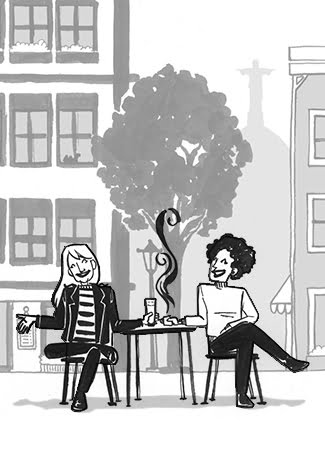
WHAT IS THE TASTE OF LISBON?
All streets in Lisbon – all of them! smell like food. There is a proper liturgy, hanging like clouds, making the kitchen a sacred place, even when it seems messy when we look through the half-open windows Miracles happen here, I have seen it with my own eyes, like when Portuguese prepare dishes with bread, olive oil and garlic that challenge the sin of gluttony. The bell ringing among the seven hills seems to warn that it is mealtime.
A man on the corner announced an almanac called Borda d’Água. I bought it for fun, after he explained to me that it has been published since 1929, exactly as it was then, in black and white, with a list of utilities, like when to sow and harvest the agricultural products. I flicked through it drinking coffee on the corner outdoor café, and found myself thinking that the almanac might well include the seasonal scents in Lisbon: to grilled sardines, during the festival of the Popular Saints (June and July); to cozido à portuguesa, on cold days; to codfish, all year round; to olive oil broth, which is the basis of all rice and seafood dishes, on weekdays; to lamb and octopus, cooking longer in the oven, on weekends and bank holidays All of a sudden, I am hungry.


It smells like rosemary, coriander, bay, oregano and glasswort It smells like cinnamon, saffron, mint, nutmeg and pepper. Every day a new scent, on every street, anytime. This gentle breeze blowing from the Tagus brings the smell, as if it were wandering in search of customers, and we want to try everything to know what it tastes like Like our mother’s kitchen, like our childhood memories, like fishing on the high seas, like hunting for survival, like fruits and vegetables picked up on the day. I have never spent so much time in restaurants, devouring menus as if they were literature and indulging in the names: peixinhos da horta (fish from the garden, meaning breaded green beans), iscas com elas (liver with them), bacalhau com todos (codfish with everything), dobrada (tripe), pica-pau (woodpecker), prego (nail, meaning beef), bitoque, tripes, caldeirada (stew), sarrabulho (stew with pork blood), jaquinzinhos (small mackerels)… and those dishes that respond by a name: Bulhão Pato, Gomes de Sá, Zé do Pipo, Abade de Priscos.
It is said that one conquers a man by his stomach, but the Portuguese conquer the whole world with their food, I can see the infatuation In fact, they have done it throughout the history: tempura and sponge cake arrived in Japan through Portuguese sailors, vindaloo marinade become a food staple in the region of Goa, India, Brazil embraced bean stew and Queen Catarina of Bragança was responsible for introducing the tea ritual in the British court. I remember reading an article on BBC, while I was devouring a cozido à portuguesa, admitting that “Portuguese cuisine may be the most influential cuisine on the planet”. Exaggeration aside, now that the tourist spotlights are pointing at Portugal, it is increasingly difficult to get a table in the usual places, but it is worth the wait Every bite and every pound I get it worth. Let there be health!
SOME GOOD EATING TABLES
FISH AND SEAFOOD.
Sea Me (Chiado)
Cervejaria Ramiro (Avenida Almirante Reis)
Kanazawa (Belém)
Furnas do Guincho (Cascais)
Restaurante da Adraga
O Relento (Algés)
TRADICIONAL
Taberna Sal Grosso
Taberna da Rua das Flores
Solar dos Presuntos
Zé Varunca
Adega Saraiva
Casa da Dízima (Paço d’Arcos)
Casa Galega (Paço d’Arcos)
GOURMET
Time Out Market (Mercado da Ribeira)
JNcQuoi
Gourmet Experience El Corte Inglés
FOODS OF THE WORLD.
La Siesta (Algés)
VEGETARIAN/VEGAN
Arkhe
My Mother’s Daughters
House of Wonders (Cascais)
SWEET ENDING
Pastel de nata, da Manteigaria (Chiado e Mercado da Ribeira).
Os autênticos Pastéis de Belém (Belém)
Gelados da Santini (Chiado e Cascais)
Travesseiros da Casa Piriquita (Sintra)
Queijadas da Sapa (Sintra)



